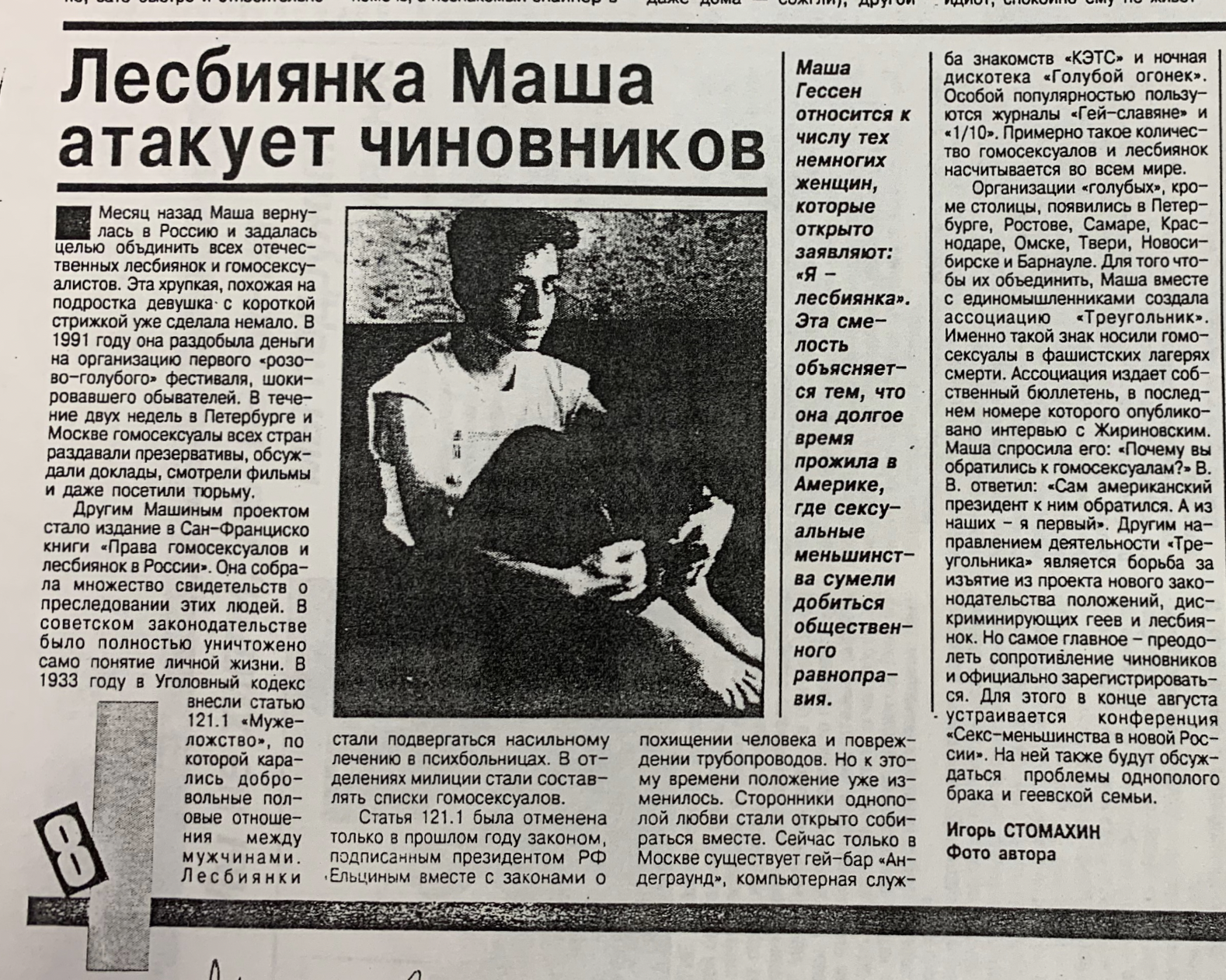"Masha the Lesbian Attacks the Officials"

Lesbian Masha Attacks the Officials
A month ago, Masha returned to Russia with the goal of uniting all Russian lesbians and homosexuals. This fragile, teenage-looking girl with short hair has already accomplished quite a lot. In 1991, she secured funding to organize the first "pink-blue" festival, which shocked ordinary citizens. For two weeks in St. Petersburg and Moscow, homosexuals from various countries distributed condoms, discussed reports, watched films, and even visited a prison.
Another of Masha's projects was the publication in San Francisco of the book "Rights of Homosexuals and Lesbians in Russia." She collected numerous testimonies about the persecution of these people. In Soviet legislation, the very concept of private life was completely destroyed. In 1933, Article 121.1 "Sodomy" was added to the Criminal Code, which punished consensual sexual relations between men. Lesbians began to be subjected to forced treatment in psychiatric hospitals. Police departments began compiling lists of homosexuals.
Article 121.1 was repealed only last year by a law signed by Russian President Yeltsin, along with laws on kidnapping and pipeline damage. But by this time, the situation had already changed. Supporters of same-sex love began to gather openly. Currently, Moscow has the gay bar "Underground," the computer dating service "CATS," and the nightclub "Blue Light." The magazines "Gay-Slavs" and "1/10" enjoy special popularity. Approximately this proportion of homosexuals and lesbians is estimated worldwide.
Image caption: Masha Gessen is among those few women who openly declare: "I am a lesbian." This courage is explained by the fact that she lived for a long time in America, where sexual minorities have managed to achieve social equality.
Organizations for "gays," besides the capital, have appeared in St. Petersburg, Rostov, Samara, Krasnodar, Omsk, Tver, Novosibirsk, and Barnaul. To unite them, Masha, together with like-minded individuals, created the association "Triangle." This was the symbol worn by homosexuals in Nazi death camps. The association publishes its own bulletin, the latest issue of which featured an interview with Zhirinovsky. Masha asked him: "Why did you address homosexuals?" V. replied: "The American president himself addressed them. And among Russians—I was the first." Another focus of "Triangle's" activities is the struggle to remove provisions discriminating against gays and lesbians from draft legislation. But the most important goal is to overcome official resistance and become officially registered. For this purpose, a conference on "Sexual Minorities in the New Russia" is being organized at the end of August. It will also discuss issues of same-sex marriage and gay families.
Igor STOMAKHIN
Photo by the author
This 1994 piece from the weekly magazine Megapolis Express displays several aspects of emerging Russian LGBTQ culture in the early 1990s, embodied in the figure of the Russian-American journalist and activist M. Gessen, whom the article presents as a uniquely audacious agent of progress in the area of sexual pluralism in Russia. One notable theme here is post-Soviet Russia’s fraught relationship with the US. After fifty years of Cold War, Russia had effectively acknowledged the failure of Soviet Communism, abandoning it in favor of the economic and political systems championed by its longtime adversary. In the 1990s, Russia’s pursuit of a model of statehood resting on free-market capitalism and representative democracy was attended by a certain anxiety of influence vis-à-vis the US, and also by a search for local variants of those economic and political novelties.
Analogous tensions existed in emerging Russian LGBTQ culture, which sought to emulate some aspects of Western LGBTQ movements while recuperating an organically “Russian” version of LGBTQ society and history. The subject of this article, Gessen, presents the perfect occasion to consider this set of issues. Born in Moscow in 1967, Gessen emigrated to the United States in 1981. In 1991, they returned to Russia to pursue a career in LGBTQ activism and journalism. Twenty-two years later, Gessen moved back to the US in response to direct threats against their family in a climate of mounting anti-LGBTQ persecution. This item presents Gessen as a carrier of a dual identity: a native Russian who came of age as a lesbian in the US in the 1980s, when they were able to self-actualize in a way that would likely not have been possible in 1980s Russia. At the same time, Gessen is a lesbian who voluntarily returned to Russia at the beginning of the new post-Soviet era to foster the development of a local LGBTQ movement. The article attributes Gessen’s self-confidence in their assertion of lesbian identity, and their effectiveness as a community organizer, to the ten formative years spent in the US.
There is, then, the reference to Vladmir Zhirinovsky and Gessen’s interview with him published in a 1994 issue of the Triangle Bulletin. A nationalist presidential candidate in the Russian elections of 1991 and 1996, Zhirinovsky cites American precedent for his new model of Russian politics. He speaks of his openness to LGBTQIA voters as political allies or at least fellow travelers, and his belief that the state should not interfere in the sexual lives of its citizens. He cites here the precedent of US President Bill Clinton addressing American LGBTQIA communities. In January 2022, a few short months before he died, Zhirinovsky, a perennial loose cannon, suggested that Russia should restore a tsarist or imperial autocracy buttressed by the Orthodox Church. The very notion of a Russian presidency was absurd, he claimed, adding: “Where do we think we are? America? France?”
Published at a transitional moment when Megapolis Express was becoming more of a Western-style tabloid, this piece in an interesting artifact of curiosity and, likely, anxiety about a merging of Russian and American political and social culture as instantiated by public discussions of sexual pluralism, and embodied in the national political figure of Zhirinovsky and the grassroots activist M. Gessen.